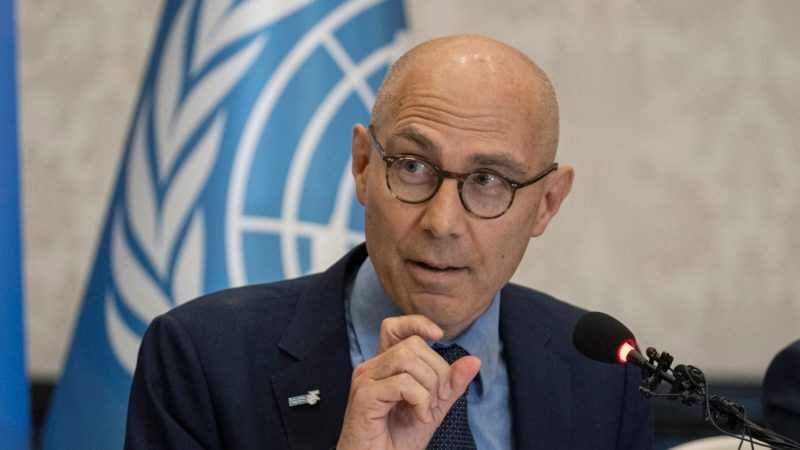BTN News: With critical elections approaching in countries worldwide, the United Nations Human Rights Chief, Volker Türk, has issued a stark warning to voters about the dangers of supporting “strongmen” leaders who offer simple, unrealistic solutions to complex problems. In a powerful address to the UN Human Rights Council, Türk urged global citizens to remain vigilant against populist politicians who use divisive rhetoric and scapegoating to gain power. He highlighted the impact of political decisions on human rights, the dangers of rising authoritarianism, and growing concerns over conflicts in regions like the Middle East, Ukraine, and Sudan. As nations such as the United States, Georgia, and Tunisia prepare for their elections, Türk’s message is a call to action for voters to choose candidates who genuinely support human rights and democratic values.
Populist Leaders Pose a Risk to Global Human Rights
In his opening speech to the UN Human Rights Council’s autumn session, Volker Türk, the UN Human Rights Chief, sounded an alarm over the rise of authoritarian political figures. He cautioned voters against falling for “strongmen” who employ misleading tactics and emotional appeals to win votes. “Be wary of the loud voices and ‘strongman’ styles that throw glitter in our eyes, offering imaginary solutions that deny reality,” Türk warned, without naming specific leaders or countries.
The Dangers of Scapegoating and Divisive Rhetoric
Türk expressed deep concern about the use of divisive rhetoric, especially during election campaigns, where politicians often target minorities, migrants, and refugees to gain support. He specifically pointed out that such tactics have been prevalent in nations including the United States, France, Germany, Hungary, and the United Kingdom. “These scapegoating practices undermine the fabric of our societies and erode human rights,” Türk emphasized.
Human Rights Under Threat in Conflict Zones
The UN Human Rights Chief also spotlighted the devastating impact of ongoing armed conflicts on civilian populations. Highlighting the recent escalations in the Middle East, he condemned the “horrific” October 7 attacks in Israel, which resulted in over 1,200 deaths, and the ensuing conflict in Gaza, where over 40,000 Palestinians have lost their lives due to Israeli military actions. Türk warned that these tragedies could fuel “cycles of hatred” that perpetuate instability in the region.
Meanwhile, in Ukraine, civilians are “trapped in cycles of terror” as Russian military forces continue their aggressive assaults. Türk criticized Russia for refusing his team’s request to access the southwestern region of Kursk to assess the local human rights situation, following a recent incursion by Ukrainian forces. “It is concerning that access to monitor human rights remains restricted,” he said, urging full transparency from all parties involved.
Sudan’s Humanitarian Crisis Reaches Alarming Levels
Another critical issue Türk addressed was the escalating humanitarian crisis in Sudan, where ongoing conflict has claimed at least 20,000 lives. “The world cannot stand by and allow this tragedy to continue,” Türk declared, calling for urgent international action to address the growing catastrophe.
Positive Trends Amid Global Challenges
Despite the troubling global landscape, Türk noted some positive developments. He welcomed the global trend towards abolishing the death penalty, although he voiced concern over the rise in executions in countries like Iran and Saudi Arabia. Furthermore, Türk celebrated advances in LGBTQ+ rights, including the decriminalization of same-sex relations in various regions. However, he condemned recent legislative moves in countries such as Ghana, Indonesia, Iraq, and Uganda to penalize such relations further.
Threats to Freedom of Expression and Civil Liberties
Türk also raised alarms over increasing efforts to suppress freedom of speech, assembly, and the press. He highlighted several concerning cases, including the detention of journalists in Azerbaijan, which is set to host a United Nations climate conference in November, the imprisonment of opposition leaders in Tunisia, and the severe restrictions on civil liberties in China. “These actions represent a direct assault on fundamental freedoms,” Türk asserted, calling for international solidarity to protect human rights defenders.
Call to Action: Protecting Human Rights in Elections and Beyond
As the world enters a year filled with pivotal elections in countries like Georgia, Tunisia, and the United States, Türk urged voters to consider which candidates will genuinely uphold human rights and democratic values. “I implore voters to critically evaluate political platforms and support those committed to advancing human rights globally,” he concluded.
Conclusion: A Global Responsibility
In a world facing significant human rights challenges, Volker Türk’s message to the UN Human Rights Council serves as a reminder of the power and responsibility that voters hold. As political tensions rise and elections near, the international community must remain vigilant against leaders who threaten to undermine the principles of democracy and justice.


